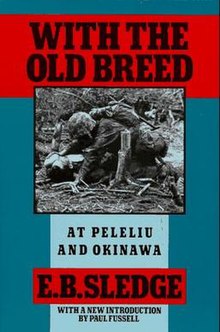With the Old Breed

Oxford University Cover
|
|
| Author | Eugene B. Sledge |
|---|---|
| Country | United States |
| Language | English |
| Genre | War Memoir |
| Publisher | Presidio Press |
|
Publication date
|
1981 |
| Media type | |
| Pages | 326 p. |
| ISBN | |
| OCLC | 22653690 |
| 940.54/26 20 | |
| LC Class | D767.99.P4 S55 1991 |
| Followed by | China Marine: An Infantryman's Life after World War II |
With the Old Breed: At Peleliu and Okinawa is a World War II memoir by Eugene Sledge, a United States Marine. Since its first publication in 1981, With the Old Breed has been recognized as one of the best first-hand accounts of combat in the Pacific during World War II. The memoir is based on notes Sledge kept tucked away in a pocket-sized Bible he carried with him during battles.
By his own account, Sledge began writing the memoir in 1944, "immediately after Peleliu while we were in rest camp on Pavuvu Island", and continued working on it "as soon as I returned to civilian life" in 1946. Nicknamed "Sledgehammer" by his comrades, Sledge experienced combat during the battles of Peleliu and Okinawa as a 60 mm mortarman while part of K Company, 3rd Battalion, 5th Marines, 1st Marine Division (K/3/5).
The book's working title was A Marine Mortarman in World War II, which Sledge later changed to Into The Abyss. The book was first published under its final title by the Presidio Press in 1981.
Sledge's memoir gives a firsthand and unapologetically honest perspective on the Pacific Theater of World War II. His memoir is a front-line account of infantry combat in the Pacific War. It brings the reader into the island hopping, the jungle heat and rain, the filth and malaise, the fear of potential "banzai attacks", and the hopelessness and loss of humanity that so uniquely characterized the campaign in the Pacific. Sledge wrote starkly of the brutality displayed by Japanese (and to a much lesser extent, American) soldiers during the battles, and of the hatred that both sides harbored for each other. In Sledge's words, "This was a brutish, primitive hatred, as characteristic of the horror of war in the Pacific as the palm trees and the islands."
Sledge describes one instance in which he and a comrade came across the mutilated bodies of three Marines, butchered and with severed genitals stuffed into their mouths. He also describes the behavior of some Marines towards dead Japanese, including the removal of gold teeth from Japanese corpses (and, in one case, a severely wounded but still living Japanese soldier), as well as other macabre trophy-taking. He details the process and mechanisms that slowly strip away a soldier's humanity and compassion, making the thought process accessible to those who have never served in combat.
...
Wikipedia
